Information about the course of our trekking tours
 Hafid Benyachou, the owner of Akabar – Sahara Treks, comes from a large nomad family. He still remembers that his father was walking with his herds from Morocco through Algeria to Mali. Hafid has set himself the task of supporting the nomadic population of Sahara. More about this under “Aid projects for the nomadic population”. Hafid Benyachou has no business premises, camels and jeeps. He accompanies most tours as a guide, so it could take a few days that he answers a request. For parallel tours, the trekking groups will be accompanied by Mohammed and Ydir Oukhayi, Yusuf Rabouze as well as Hafid’s brother Ali. They have many years of experience as tour guides or as independent tour organizers (Ali Benyachou).
Hafid Benyachou, the owner of Akabar – Sahara Treks, comes from a large nomad family. He still remembers that his father was walking with his herds from Morocco through Algeria to Mali. Hafid has set himself the task of supporting the nomadic population of Sahara. More about this under “Aid projects for the nomadic population”. Hafid Benyachou has no business premises, camels and jeeps. He accompanies most tours as a guide, so it could take a few days that he answers a request. For parallel tours, the trekking groups will be accompanied by Mohammed and Ydir Oukhayi, Yusuf Rabouze as well as Hafid’s brother Ali. They have many years of experience as tour guides or as independent tour organizers (Ali Benyachou).
We start our daily hike at 9 am and walk for about three to four hours in the morning. After an extensive lunch break we hike another one to two hours, all at a quiet pace, together with the caravan – the chameliers with their camels. The team carefully select the resting places for lunch and dinner. Freshly prepared tea and snacks are ready and waiting when we reach our midday resting place and our overnight camp. The breakfast is rich and varied: it consists for example of tea, coffee, bread, omelette, olives, jam, honey, eggs and spread cheese. For lunch there are salad variations with side dishes, mineral water and juices. Dinner includes soup and a main course like couscous, tajine or pasta dishes and a desert. If there is enough firewood available, the cook prepares the traditional flatbread in the embers during the evening. Otherwise, the bread is freshly baked in the pan.
We do not have a sportive requirement profile, nevertheless our guests should have experience of several hours of walking – also in mountain landscapes – as well as be sure-footed. There is plenty of time to take pictures, enjoy and relax.The team depends on your fitness, so long daily stages of 20 km or just a few hours can be walked. A rest day is also possible. We also orientate ourselves on the weather, i.e. in case of great heat and sandstorms we either hike less and have a longer lunch break or start earlier in the morning and walk only until afternoon (1 – 2 pm). Alternatively, Hafid reserves the right to change the route for the benefit of the guests.
On our tours we offer sufficient mineral water, so the drinking water does not have to be treated extra. During the daily hike it is possible to refill with mineral water at any time.
You spend the night under the starry sky or in a tent. Akabar – Sahara Treks provides large tents as well as special 2-person tents. Mattresses and blankets are also included.
You will receive complete information on trekking, equipment and Morocco following your booking with us.
Season: Camel trekking in the dune landscapes and Jebel Bani from mid-September to May. During the hot months, the treks start in the early morning and end around midday, and preference is given to walking in the plateaus of the Jebel Bani Mountains.
Duration of the trekking tours: three days to 15 days, longer hikes are possible.
Execution of the trekking tour: from one person onwards
We look forward to hearing from you!
Give us a call or write to us!
Booking and info: Akabar – Sahara Treks, Hafid Benyachou, Zagora
Whatsapp + 212 621 584295
Mail: akabartrekking@gmail.com or info@marokko-nomaden.de
Advice on trekking tours and equipment: Monika Boch-Jacuk, Tel. +49(0)76325196
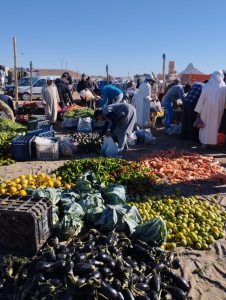
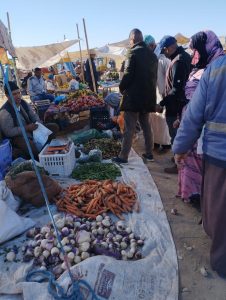
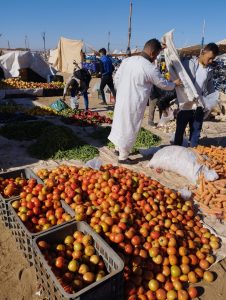
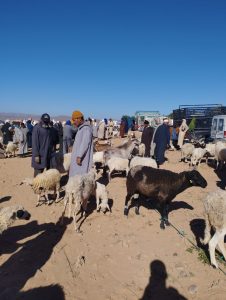
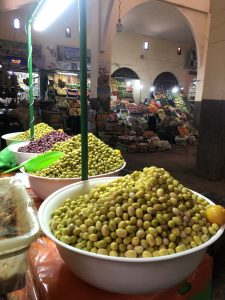
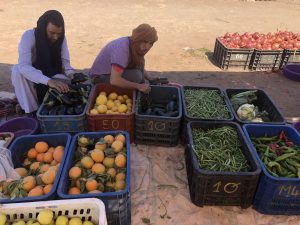
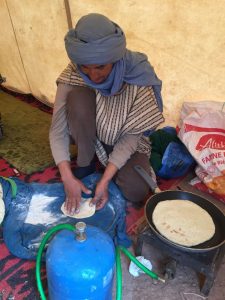
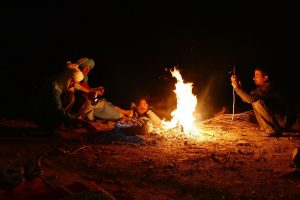
Travel information
Jerome Blösser’s illustrated book WüstenWandern – Begegnungen mit der Unendlichkeit (Desert Hiking – Encounters with Infinity) is recommended for travel preparation. In addition to his explanations of hiking in the desert, time and the experience of silence, topics such as weather, clothing, water and food as well as photography are covered in detail.
Transfer
Airlines from Germany/France/Switzerland to Morocco:
- Royal Air Maroc, Frankfurt, Munich, Straßbourg
- easyJet from Bale/Mulhouse
- airberlin
- ryanair
- TUI
- Transavia from France, Austria, Netherlands, Switzerland
- Air Arabia
- Edelweiss Air from Switzerland
The following applies to delayed baggage: In Morocco, baggage can not be delivered due to local customs regulations. There, all luggage must be collected personally at the airport.
From Marrakech airport, bus no. 19 takes you to the city centre, which is only about 7 km from the airport. The bus stops in front of the terminal, in the car park behind the taxi stands. The ticket to the city centre costs about 30 DH: https://marrakeshairport.info/transport/airport-bus/
Transfer to Zagora:
1. Flights to Zagora are available by Royal Air Maroc from Casablanca to Zagora https://www.royalairmaroc.com/de-de
2. Moroccanian bus companies for public bus transfer:
3. Transfer by Grand-Taxi
Taxi stands at Bab Doukhala, price per trip to Ouarzazate and Zagora approx. 120 Dirham per section, but often you have to pay double the price for your own seat, because in the taxi 2 people sit on one seat. For the onward journey to Zagora, change in Ouarzazate and pay again there.
4. Transfer by private taxi directly from Zagora
(booking via H. Benyachou) price at the moment approx.150 EUR each tour from and to Marrakech and approx. 65 EUR each from and to Ouarzazate
Duration of journey: Marrakech – Zagora = 7 – 8 hours
Ouarzazatre – Zagora = 2 – 3 hours
Hotels:
In Amezrou, ca 1,5 km from Zagora in the palm gardens near riber Draa, alleyways between the garden invite to walks, all very quiet.
- Riad Le Petit Jardin: https://www.riadlepetitjardin.com/en/
- Dar Nekhla, Maison d’Hotes: www.riadzagora.fr
- La Petite Kashbah
- La Fibule du Draa: https://casbah-la-fibule-du-draa-zagora.business.site/
You are also welcome to stay overnight at the Benyachou family home before the tour. Ali Benyachou’s wife may also visit a traditional hamam with female guests. Overnight stay with breakfast and dinner costs 20 EUR per person/day.
In Marrakech: We can give information about some hotels. Please ask us.
In Ouarzazate for example:
- Hotel Azoul
- Riad Dar Barbara: http://www.riaddarbarbara.com/
In/near Agadir:
Trekking – Equipment
A desert trip is a stay in an extreme climate, which means that in the desert spring in March/April, for example, it can get over 30 degrees for a few days, while in May or September there can be cooler days and even rain is possible. The “cooler days” correspond to German spring or summer weather. We therefore recommend the trekker to wear adapted clothing (twilight look) as described below, but no jeans, shorts or miniskirts. In the very dry air you hardly sweat.
As we are partly walking in the Jebel Bani Mountains, we also recommend walking shoes for your safety. We walk on narrow, uneven paths of the shepherds, cross-country over small scree and sometimes climb over boulders.
The following equipment list is based on our many years of trekking experience, serves as a recommendation and does not claim to be complete. You will receive a detailed description after your booking.
Clothing
- Light and comfortable trousers made of cotton, linen or cotton/linen blend
- Light trekking jacket, thin rain jacket (also for sandstorms)
- for evenings: fleece jacket, wool jacket and/or waistcoat
- shirts, long-sleeved blouses, breathable sports shirts or polo shirts
- Underwear
- Pyjamas or ski underwear for the night
- Cap, headscarf or chech (covers head and neck perfectly)
- gauntlets or cut-off socks help against sunburn on the hands
- Hat, scarf, gloves for trekking from November to MarchShoes and socks:
- Socks: almost no sand gets into thin, close-meshed socks.
- Trekking sandals
- light, high, dense hiking shoes, dense trainers, chucks or desert boots. No sports shoes with mesh! the sand penetrates everywhere and quickly causes difficulties when walkingToiletries:
- Disposable flannels, disposable towels or sponge plus 0.5 l water container and synthetic towel.
- Moist wipes in case there is no possibility to wash and for in-between use
- soap
- Toothbrush accessories
- Travel towel
- Sun cream with sun protection factor 30-50
- Lip cream with a high sun protection factor
- Personal hygiene items plus small waste bags/parchment bags.
- Medication such as: Eye drops, painkillers, diarrhoea medication, blister plasters and/or blister gel from Compeed, deer tallow cream, horse ointment......
- Bandages and plasters
- Nasal spray and/or ointment for dry nasal cavitiesTrekking lugage:
- Backpack or soft travel bag; the main luggage should not exceed 15 kg per person, as it will be loaded onto the camels.
- Daypack for approx. 20 l, for water bottle, camera, sunscreen, personal items
- Sleeping bag (light), for trekking from Dec. - Feb. warm sleeping bag
- possibly a sheet and travel pillow
- Headlamp with spare batteries
- Water bottles - e.g. 1 or 1.5 l sturdy PET bottles
- Matches or lighter (for burning toilet paper and waste) - can be bought in Zagora
- waste bags
- To improve the taste of the water, concentrated lemon juice (yellow bottle) and/or
- Effervescent tablets
- Plastic bag to protect your camera from sand
- Walking sticks (useful in the dunes)
- Camping matInfo about sleeping mats: Akabar – Sahara Treks provides foam mattresses with a thickness of about six cm. Those who need an additional sleeping mat can bring their own. During the meals the participants sit on it. If you have your own sleeping mat, you can go to bed earlier without interrupting the cosy round.
Info on sleeping bag:
In the desert there are also weather fluctuations and the temperatures can deviate by 10 degrees, especially during the night.
The comfort range of the sleeping bag should depend on the time booked, i.e. in the months of November to March approx. + 5 degrees Celsius. Women should ensure a comfort range of approx. 0 degrees C, as they usually freeze faster than men. It also works very well with a light silk inlet/sleeping bag. Akabar – Sahara Treks provides blankets.
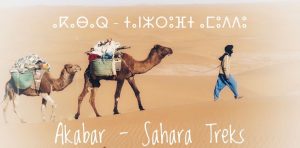
 Deutsch
Deutsch English
English Francais
Francais